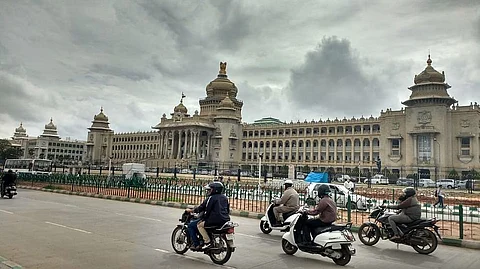
- Latest Legal News
- News
- Dealstreet
- Viewpoint
- Columns
- Interviews
- Law School
- Legal Jobs
- हिंदी
- ಕನ್ನಡ

The Karnataka government has proposed the Karnataka Crowd Control (Managing Crowd at Events and Venues of Mass Gathering) Bill, 2025, aimed at regulating large public gatherings such as political rallies, jatras and conferences, and ensuring accountability in cases of injury or death due to mismanagement.
The Bill comes in the he wake of the stampede at Chinnaswamy Stadium during the Royal Challengers Bengaluru (RCB) IPL victory celebrations that claimed 11 lives and injured many.
The proposed legislation, officials said, is intended to fill the legislative vacuum concerning crowd management at mass gatherings and impose clear duties on organisers, law enforcement and intermediaries.
The Bill is expected to be taken up for consideration in the next cabinet meeting.
The Bill mandates prior police permission for events likely to draw large crowds and empowers authorities to change or cancel such events under prescribed conditions. It also proposes stringent penalties for violations, including imprisonment of up to three years and fines reaching ₹5 lakh for event planners who fail to obtain permissions, control crowds, or provide compensation in case of mishaps.
Notably, the proposed legislation states that it will not apply to religious events, including jatras, rathotsavas, pallakki utsavas, urus and other faith-based gatherings from its ambit.
Mandatory permissions: Organisers must apply to the jurisdictional police station with details of the expected crowd. Authorities can approve, postpone, shift, or cancel events in case of emergencies or safety concerns.
Penalties for non-compliance:
General offenders can face up to 3 years in prison or a fine of ₹5,000 or both.
Commercial event organisers (such as for sports or circuses) face harsher penalties of up to 3 years in prison or a fine of ₹5 lakh or both for failing to comply with the Act or causing crowd-related harm.
Liability for harm: Organisers will be held liable if their event causes death or injury. In such cases, the organiser must pay compensation, failing which the government can recover it as land revenue arrears, including by auctioning the organiser’s property.
Victim impact statements: Courts are empowered to consider impact statements from victims or their families while sentencing offenders under the Act.
Aiding or abetting offences: Those who knowingly or unknowingly assist others in committing offences under the Act may also face imprisonment of up to three years.
Crowd prevention powers: District magistrates and competent authorities can prohibit events or gatherings likely to disturb peace, including those inciting communal disharmony. They may also regulate processions, sound systems, and other public activities.
Awareness and training: The government is tasked with conducting public education campaigns and training officials in crowd management and stampede prevention.
The provisions of the Bill will operate in addition to existing laws such as the Bharatiya Nyaya Sanhita, 2023 and the Bharatiya Nagarik Suraksha Sanhita, 2023, unless there is a direct conflict. It also includes immunity for government officers acting in good faith and empowers the State to frame necessary rules after prior publication and legislative review.